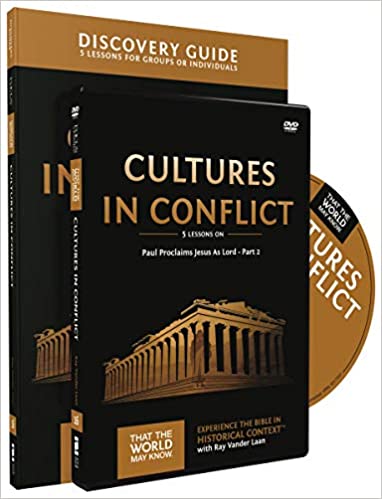Do you notice how ignorance of the facts often leads to contention? People immediately react negatively when told that one of the people closest to them is spreading lies about them. They then go on with their counterattack without first getting to the bottom of the story. They never bothered to find out if the report they heard is true or not.
Bible Verses: 1 Corinthians 1:10-13
“Now I plead with you, brethren, by the name of our Lord Jesus Christ, that you all speak the same thing, and that there be no divisions among you, but that you be perfectly joined together in the same mind and in the same judgment. For it has been declared to me concerning you, my brethren, by those of Chloe’s household, that there are contentions among you.”
“Now I say this, that each of you says, ‘I am of Paul,’ or ‘I am of Apollos,’ or ‘I am of Cephas, or ‘I am of Christ.’ Is Christ divided? Was Paul crucified for you? Or were you baptized in the name of Paul?”

Problems Among the Corinthians
Paul’s first letter to the Corinthians addresses several problems within the church that have come to his attention. One of which is the contentions (or quarrels) reported to him by some members of Chloe’s household.
The church in Corinth had become factious, advocating different leaders: Paul, Apollos, Peter, and possibly a Christ party. Not only was the church divided over leadership types, but also over several moral issues and the use of spiritual gifts. The main point of contention was Paul’s authority.
How did Paul approach this problem of division in the church? First, he pointed to the unity of Christ: only one Savior and one body. Then he reminded them of their baptism, a picture of their spiritual baptism into Christ’s body (1 Corinthians 12:13).
Division in the Church Today
A few years ago, the church was divided into denominations. Now, we aren’t much better off. We have the same problem the church at Corinth had. Many Christians today follow a favorite preacher. Why are so many people naive enough to believe they can be spiritually fed by a preacher? Or that their favorite preacher knows everything about the Bible or God?
I know for a fact that nobody completely understands the mind of God or His word, because He is infinite and we are finite. That fact should humble us all. We should not base all of our knowledge on one or two favorite preachers.
I have learned over the years that different Christians emphasize different aspects of the character of God. Preachers do the same thing. We all have our favorite topics we like to talk about because we all know our knowledge of the Bible has gaps. This is true of the pew-sitters and the pastors.
I wish I understood why this fact does not humble more people including preachers. Does your lack of understanding humble you?
I have heard so many preachers criticizing other preachers. I truly believe that if the Church and pastors were more humble, criticism of fellow believers would stop. Not to mention, why does it matter what the next person or the next pastor says, especially if they are wrong?
Know and Study God’s Word
The only way to know if someone believes something wrong is by getting to know what the truth actually is. How well do you know the Bible?
Since Only God wrote the Bible and no pastor fully understands the Bible, why are you not studying the Bible for yourself? The main reason I was able to write “Life According to the Truth” was God gave me knowledge and understanding after asking God many questions while studying the scriptures.
The pew-sitters do not need to be ignorant. You do not need a seminary degree to know the Bible. 2 Timothy 2:15 says, “Be diligent to present yourself approved to God, a worker who does not need to be ashamed, rightly dividing the word of truth.”
I would have to admit studying the Bible is not easy. It takes work but is also very rewarding as Psalm 1:1-2 says:
“Blessed is the man who walks not in the counsel of the ungodly, nor stands in the path of sinners, nor sits in the seat of the scornful. But his delight is in the law of the Lord, and in His law, he meditates day and night.”
There is no reason why any Christian should be ignorant or divided. There is no reason to rely on preachers or ministers to spiritually feed you. Just ask the Holy Spirit to teach you and He will. Have you asked Him?

Spiritual Authority in the Church
One of the underlying issues in Paul’s two letters to the Corinthians is the nature of spiritual authority.
Why should the Corinthians (and we) listen to Paul’s words? It’s because they were not his opinions or his agenda but God’s instructions. When God’s Word sets up a barrier or sends a change of direction in our lives, are we willing to listen? Or do we look for another opinion?
We can always find someone who will tell us with great confidence exactly what we want to hear. Or we can keep getting counsel until someone tells us what we wanted to do in the first place. But God’s Word has a history of contradicting our wishes.
The Scriptures don’t care nearly as much about how we feel as they do about how we obey. By the way, God never asks us to do something that is not for our own good. Even if that means giving up something that looks innocent and desirable.
Final Words
Reading Paul’s letters, we see that he had tough words for the Corinthian church. Many of these apply almost directly to wandering churches today. They were all true counsel. These instructions from God continue to be practical in the world we are living in today.
Needless to say, God’s Word won’t have the intended effect unless we allow them to transform us. Are you willing to obey God even when what He tells you is painful to hear and inconvenient to do?
Disclaimer: As an Amazon Associate, I may earn a commission when you use any links on this page to make a purchase, but at no additional cost to you.
Recommended Resource: Cultures in Conflict Discovery Guide: Paul Proclaims Jesus As Lord – Part 2 by Ray Vander Laan
 How do you live in a culture where the worldview conflicts with Christianity?
How do you live in a culture where the worldview conflicts with Christianity?
Learn from Paul as he presents his beliefs to the most powerful court in Athens and settles among the Greco-Romans of Corinth, who valued wealth and class, worship of multiple gods, and decadent pleasure seeking above all else.
Join renowned teacher and historian Ray Vander Laan as he guides you through the land of the Bible.
In each lesson, Vander Laan illuminates the historical, geographical, and cultural context of the sacred Scriptures.
Filmed on location in the Middle East and elsewhere, the That the World May Know® film series will transform your understanding of God and challenge you to be a true follower of Jesus.

